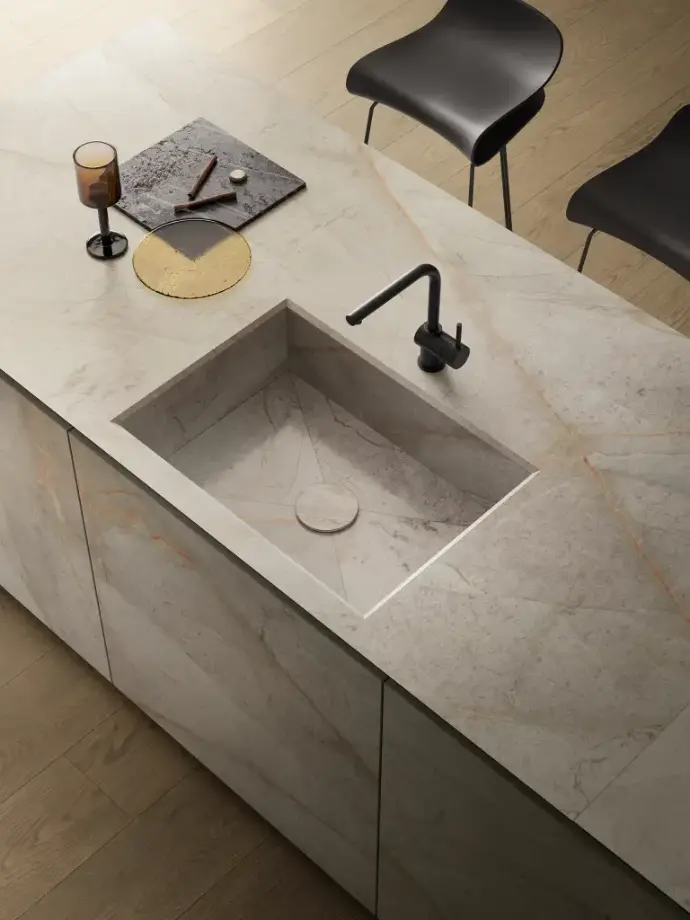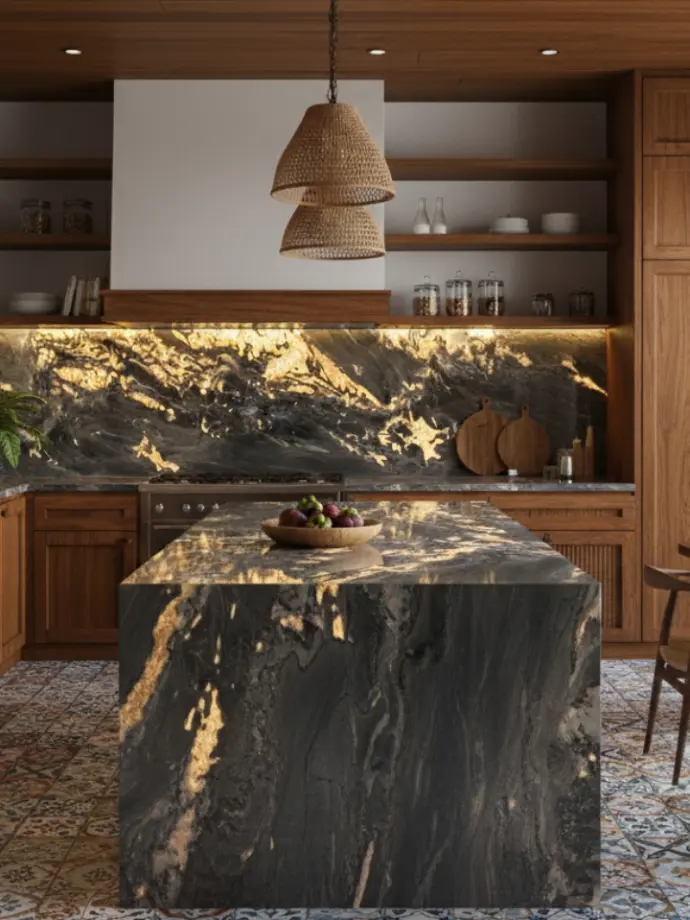Terrazzo is making a huge comeback, and it’s easy to see why. With its playful, confetti-like pattern of embedded stone chips, it offers a unique and vibrant look that can bring personality to any space. It’s a popular choice for flooring, feature walls, and even furniture.
But when it comes to the demanding environment of a home kitchen, is terrazzo a practical choice for your countertop?
While we love the aesthetic, we also believe in empowering homeowners with honest, practical advice. Before you commit to a terrazzo kitchen top, here are the critical reasons why it may not be the durable surface your kitchen deserves.
What Exactly is Terrazzo?
First, it's important to understand what it is. Terrazzo is a composite material, made by mixing chips of marble, granite, quartz, or glass with a binder. This binder is typically either cement or epoxy resin. After the mixture cures, it's ground down and polished to create a smooth, decorative surface.
It is the binder and the commonly used marble chips that are the source of terrazzo's potential weaknesses in a kitchen.
|
Feature |
Cement-based Terrazzo |
Epoxy-based Terrazzo |
|
Binder |
Portland cement |
Epoxy resin |
|
Porousness |
More porous; requires regular sealing |
Less porous; more stain-resistant |
|
Heat Resistance |
Better heat resistance; prone to thermal shock |
Low heat resistance; susceptible to scorching |
|
Flexibility |
Less flexible; more prone to cracking |
More flexible; less prone to cracking |
|
Weight |
Heavier |
Lighter |
|
Common Use |
Flooring, outdoor applications |
Wall Cladding, indoor applications |
4 Reasons to Avoid Terrazzo for Your Kitchen Top
1. It's Vulnerable to Stains and Etching
Many terrazzo mixes use marble chips as the primary aggregate. Marble is made of calcium carbonate, which has a chemical reaction with common household acids. This reaction isn't a stain that can be cleaned; it's a permanent corrosion of the surface that leaves a dull, whitish mark. This is called etching.
Think about the ingredients you use every day in your Malaysian kitchen: a splash of lime juice (limau nipis), a drop of vinegar, or tomato sauce can all leave a permanent dull spot on the marble chips within the terrazzo.
2. It's Not as Heat-Resistant as You Think
Placing a hot pot or pan directly on a terrazzo surface is a significant risk.
- Epoxy-based terrazzo, which is most common for countertops, uses a resin binder that can be scorched, burned, or discoloured by high heat.
- Cement-based terrazzo can handle heat better, but sudden temperature changes can still cause thermal shock, potentially leading to cracks.
3. It Requires Sealing and Maintenance
- Cement-based terrazzo is naturally porous and must be sealed upon installation and then re-sealed periodically to protect it from stains and moisture. In Malaysia’s humid climate, an improperly sealed top can become a hotspot for mold and mildew.
- Epoxy-based terrazzo is less porous but can still be susceptible to staining and requires careful cleaning to maintain its finish.
4. It Can Chip or Crack
While generally durable, the stone chips in terrazzo can be prone to chipping if a heavy object is dropped on an edge. Repairing terrazzo is a specialized skill and it can be difficult to match the original appearance perfectly.
The Worry-Free Alternatives for a Modern Kitchen
If you love the speckled, decorative look of terrazzo but want a surface that can handle the demands of a real working kitchen, there are far better alternatives:
- Quartz Stone: Many quartz manufacturers offer beautiful designs that mimic the look of terrazzo. Because quartz is non-porous and made with incredibly hard minerals, it is highly resistant to stains, scratches, and etching, and requires zero sealing.
- Sintered Stone or Porcelain Slab: For the ultimate in performance, sintered stone offers a range of designs and is completely heat-proof, stain-proof, and scratch-proof. It provides total peace of mind for even the busiest home chefs.
Conclusion: The Right Material for the Right Place
Terrazzo is a fantastic and durable material for low-traffic applications like flooring, bathroom vanities, and decorative walls. However, due to its vulnerability to acidic stains, heat damage, and the need for regular maintenance, it is not an ideal choice for the high-impact, demanding environment of a home kitchen countertop.
By opting for a high-performance material like quartz or sintered stone, you can achieve a similar aesthetic without compromising on the durability and peace of mind you deserve in the heart of your home.

